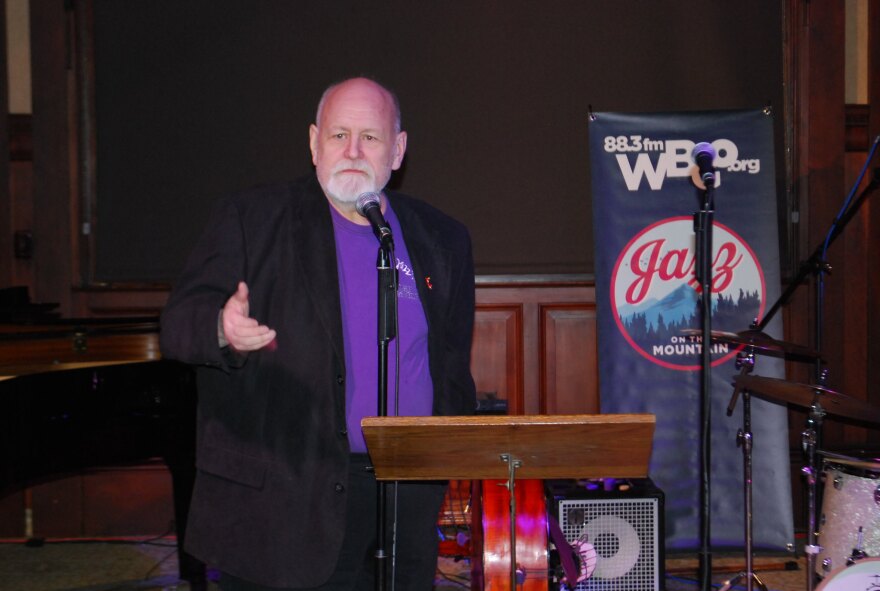As we continue to celebrate Michael Bourne's legacy at WBGO, here is a tribute from one of his former producers, Becca Pulliam — who reminds us that his presence on the air has been a gift. Don't forget to Give the Gift of Jazz during our winter fund drive!
_______________________________________________________
Michael Bourne came east from Bloomington, IN, and I came east from Madison, WI. We both had worked at the NPR stations on our Big Ten campuses. Next we wanted to work at WBGO, the new jazz station getting all the attention in Newark, NJ. We didn’t know each other until Wylie Rollins, the Program Director, gave us each a chance in the mid 1980s.
Michael hosted his first shift on New Year’s Eve, 1984. “I knocked the station off the air!” he told me on the phone last week. Later in the show he played a birthday tribute for vibraphonist Milt Jackson, and the studio line rang. It was “Bags” — Jackson himself, calling from his home in Teaneck to say “Thanks for playing my music” to the new guy. From that moment on, Michael says he felt like a “real New York disk jockey.”
Some in the audience already knew of Michael from his writing in DownBeat. His 1985 feature about the late Barry Harris is still a great read. Michael sets things up and Barry talks, telling his own story of his short migration from Detroit to New York, reflecting on steps along the way and what’s happened since, what he has learned. Michael narrates lightly and tells the reader about Barry’s recordings.

By 1986, Michael had become the host of WBGO’s weekly performance show, The American Jazz Radio Festival, syndicated by NPR. I was the producer (Wylie’s idea), and our mission was to cover the national scene. So we had to go places. Here we are on Memorial Day weekend, late 1980s, in Texas.
The El Paso Jazz Festival had invited us to broadcast the first night live. Poncho Sánchez opened for the Count Basie Orchestra led by Frank Foster, with special guest Diane Schuur singing at the piano. The stage was uncovered and so was the audience, in a big parking lot with a great vibe. Sky was everywhere. The music started in the evening and continued into the night, the Basie band stirring it up as darkness fell, and I’m pretty sure there was a full moon. This was the opposite of a stadium gig. It was a local gig with the Greatest Band in the Land (I think that’s what we called it), and we — as NPR — were there. The tapes (fragile) and personnel and set lists and even Michael’s scripts, I hope, are intact in the WBGO archive, so that someday we can hear that show again.
The next day, Michael and I walked across a long, narrow bridge from El Paso to Juarez. There was almost no border patrol. We did find the Kentucky Club where — according to Michael — Ernest Hemingway and Gary Cooper used to drink. Again it was bright outside but cool and dark in, with bottles of Mexican beer across the back of the bar and an NBA playoff game on TV. The Pistons lost to the Celtics by one point. We had a fun day.
And that’s when I made a friend of Michael Bourne. Until then I had been pretty scared of him, not sure I was the best person to edit his scripts or ask him to reread a page in the studio. Or even a paragraph. I thought he thought that if he let me start directing him, Pandora’s box would open and never close again.
Through the late ‘80s, Michael was WBGO’s national voice. Live from the new Performance Studio, he hosted the countdown to 1987 featuring the high-energy Brazilian pianist Tania Maria and her band. At a Singers Unlimited brunch and live broadcast from what we then called “Jazz 88,” he introduced Dianne Reeves (very new to the scene) opening for the elegant Joe Williams (anticipating Michael’s Blues Hour by a quarter-century). These broadcasts were fun and successful because when Michael said, “Turn on my mic,” he meant it. He had the Word, and the Word was Jazz.
Thank you, Michael Bourne. Please finish your memoir.


